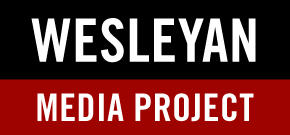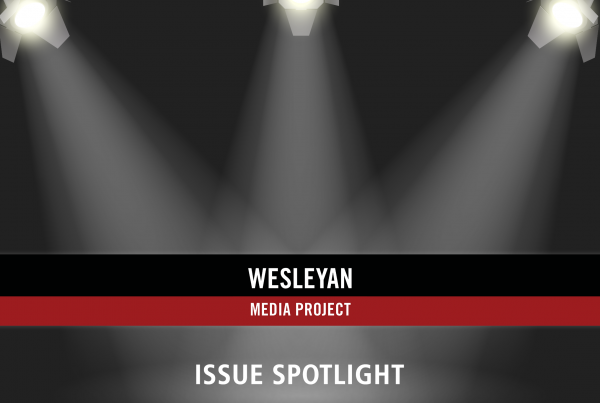(MIDDLETOWN, CT) October 4, 2022 – The Wesleyan Media Project is releasing the second post in a series of regularly updated overviews of issue mentions in federal races by state. Below we show the percentage of ads mentioning seven key issues tracked by the WMP (abortion, energy/environment, guns, health care, immigration, inflation, public safety). The post covers ads from all sponsors (candidates, parties, and outside groups) aired on broadcast TV in U.S. House and U.S. Senate races from September 1, 2022 to September 30, 2022. Note that percentages across the columns may total more than 100 percent because ads often feature more than one issue.
The WMP plans to release monthly issue spotlights through the fall campaign season.
Click a state above to see a graph of the seven issues for that state.
Data visualization by Breeze Floyd ’22 with code from Elizaveta Kravchenko ’19.
Figures include broadcast TV ad airings for U.S. House and U.S. Senate from 9/1/22 to 9/30/22.
CITE SOURCE OF DATA AS: Kantar/CMAG with analysis by the Wesleyan Media Project.
Table 1: Issues by State in Federal Races, September 2022
| State | TV Ad Airings | Abortion | Energy/ Environment | Guns | Immigration | Inflation | Healthcare | Public Safety |
|---|---|---|---|---|---|---|---|---|
| Total† | 477,525 | 17% | 15% | 4% | 10% | 19% | 14% | 26% |
| Pro-Dem | 266,504 | 28% | 11% | 6% | 3% | 8% | 21% | 21% |
| Pro-GOP | 209,440 | 3% | 20% | 2% | 18% | 32% | 5% | 32% |
| AK | 6,019 | 41% | 11% | 1% | 0% | 7% | 0% | 1% |
| AR | 1,026 | 0% | 18% | 0% | 0% | 39% | 52% | 0% |
| AZ | 26,455 | 35% | 13% | 0% | 25% | 12% | 6% | 16% |
| CA | 33,711 | 16% | 52% | 0% | 1% | 20% | 8% | 11% |
| CO | 15,346 | 25% | 41% | 9% | 8% | 33% | 27% | 10% |
| CT | 6,149 | 15% | 20% | 6% | 0% | 34% | 10% | 9% |
| FL | 18,135 | 47% | 0% | 0% | 38% | 0% | 18% | 58% |
| GA | 28,921 | 2% | 7% | 25% | 5% | 15% | 15% | 34% |
| IA | 17,772 | 6% | 18% | 0% | 5% | 17% | 20% | 13% |
| ID | 3,079 | 0% | 62% | 0% | 0% | 62% | 0% | 0% |
| IL | 8,437 | 35% | 11% | 0% | 0% | 27% | 19% | 1% |
| IN | 3,770 | 46% | 0% | 0% | 0% | 23% | 1% | 18% |
| KS | 4,990 | 7% | 22% | 0% | 8% | 29% | 7% | 7% |
| KY | 1,303 | 0% | 0% | 0% | 0% | 36% | 0% | 0% |
| LA | 3,515 | 15% | 0% | 0% | 42% | 0% | 15% | 46% |
| MD | 1,072 | 0% | 2% | 0% | 0% | 2% | 45% | 17% |
| ME | 8,000 | 0% | 35% | 0% | 13% | 40% | 32% | 11% |
| MI | 18,078 | 9% | 16% | 0% | 4% | 22% | 18% | 13% |
| MN | 4,385 | 16% | 15% | 0% | 0% | 27% | 16% | 0% |
| MO | 1,048 | 48% | 0% | 0% | 0% | 13% | 48% | 0% |
| MT | 7,654 | 0% | 35% | 0% | 17% | 32% | 0% | 11% |
| N/A | 2 | 0% | 0% | 0% | 0% | 0% | 0% | 0% |
| NC | 22,098 | 11% | 5% | 0% | 5% | 9% | 14% | 11% |
| ND | 1,070 | 0% | 42% | 0% | 0% | 0% | 0% | 42% |
| NE | 5,813 | 0% | 17% | 0% | 0% | 25% | 46% | 24% |
| NH | 26,477 | 24% | 6% | 8% | 21% | 14% | 12% | 16% |
| NJ | 1,626 | 6% | 1% | 0% | 0% | 24% | 21% | 0% |
| NM | 9,415 | 23% | 14% | 0% | 19% | 33% | 3% | 62% |
| NV | 26,966 | 30% | 8% | 0% | 6% | 17% | 20% | 18% |
| NY | 8,160 | 44% | 7% | 12% | 0% | 17% | 40% | 21% |
| OH | 28,629 | 3% | 2% | 0% | 3% | 11% | 2% | 43% |
| OR | 11,865 | 29% | 11% | 0% | 0% | 23% | 28% | 36% |
| PA | 35,217 | 3% | 6% | 15% | 9% | 28% | 8% | 58% |
| RI | 3,903 | 40% | 33% | 0% | 0% | 6% | 11% | 20% |
| SC | 835 | 0% | 0% | 41% | 0% | 18% | 0% | 41% |
| TX | 10,588 | 7% | 30% | 3% | 26% | 14% | 13% | 34% |
| UT | 4,758 | 0% | 28% | 0% | 0% | 19% | 0% | 0% |
| VA | 12,393 | 29% | 12% | 2% | 0% | 23% | 15% | 24% |
| VT | 130 | 0% | 0% | 8% | 0% | 11% | 81% | 0% |
| WA | 14,054 | 37% | 11% | 0% | 0% | 35% | 26% | 15% |
| WI | 34,661 | 5% | 10% | 5% | 19% | 9% | 13% | 49% |
| † Total includes ads promoting candidates from other parties. Figures are from September 1, 2022 - September 30, 2022. Numbers include broadcast television. States with zero federal airings during this period: AL, DE, HI, MA, MS, OK, SD, TN, WV, WY. CITE SOURCE OF DATA AS: Kantar/CMAG with analysis by the Wesleyan Media Project. |
||||||||
About This Report
Data reported here from Kantar/CMAG do not cover local cable buys, only broadcast television, national network and national cable buys.
The Wesleyan Media Project provides real-time tracking and analysis of all political television advertising in an effort to increase transparency in elections. Housed in Wesleyan’s Quantitative Analysis Center – part of the Allbritton Center for the Study of Public Life – the Wesleyan Media Project is the successor to the Wisconsin Advertising Project, which disbanded in 2009. It is directed by Erika Franklin Fowler, professor of government at Wesleyan University, Michael M. Franz, professor of government at Bowdoin College and Travis N. Ridout, professor of political science at Washington State University. WMP personnel include Laura Baum (Associate Director), Breeze Floyd (Research Coordinator), Pavel Oleinikov (Associate Director, QAC), Markus Neumann (Post-Doctoral Fellow), and Jielu Yao (Post-Doctoral Fellow).
Data are provided by Kantar/CMAG with analysis by the Wesleyan Media Project. The Wesleyan Media Project is partnering again this year with OpenSecrets, to provide added information on outside group disclosure and candidate status.
Periodic releases of data will be posted on the project’s website and dispersed via Twitter @wesmediaproject. To be added to our email update list, click here.
For more information contact:
media@wesleyan.edu
About Wesleyan University
Wesleyan University, in Middletown, Conn., is known for the excellence of its academic and co-curricular programs. With more than 2,900 undergraduates and 200 graduate students, Wesleyan is dedicated to providing a liberal arts education characterized by boldness, rigor and practical idealism. For more, visit wesleyan.edu.




